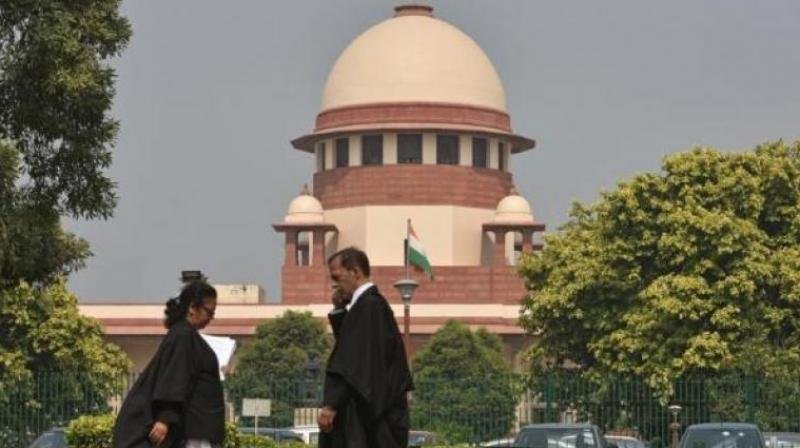11,820 custodial deaths in 5 years
லாக்அப் சாவுகளை தடுத்தல், விசாரணைக்கு தேவையான ஒழுங்கு விதிமுறைகளை உண்டாக்குதல் ஆகியன சம்பந்தமாக டி.கே.பாசு என்ற நபர் உச்ச நீதிமன்றத்தில் ஓர் வழக்கு தொடர்ந்துள்ளார்.
இந்த வழக்கு 27 ஆண்டுகளாக விசாரணையில் உள்ளது. இவ்வழக்கில், நீதிமன்றத்துக்கு உதவ மூத்த வழக்கறிஞர் ஏ.எம்.சிங்வி நியமிக்கப்பட்டுள்ளார். இந்த வழக்கு விசாரணை, நீதிபதிகள் நிஜ்ஜார், கலிபுல்லா ஆகியோர் உள்ளடக்கிய அமர்வு முன்பு விசாரணைக்கு வந்தது. அப்பொழுது, சிங்வி ஆஜராகி கூறியதாவது:-
குற்றம்சாற்றப்பட்டவர்களை கைது செய்வது மற்றும் சிறையில் அடைப்பது தொடர்பாக ஏற்கனவே உச்சநீதிமன்றம் பல்வேறு வழிகாட்டுதல்களை போலீசாருக்கு தெரிவித்துள்ளது. இருந்த போதிலும் லாக் அப் மரணங்கள் அதிகரித்துள்ளது கவலை அளிப்பதாக உள்ளது.
கடந்த 5 ஆண்டுகளில், லாக்அப்களில் 11,820 பேர் இறந்துள்ளனர். இவர்களில் 3,532 பேர் காவல்துறையின் சித்திரவதையால் இறந்தது கண்டறியப்பட்டுள்ளது. இதனால் லாக்அப் மரணத்தை தடுக்கவும் மற்றும் விசாரணையை ஒழுங்குபடுத்தவும் மேலும் 15 வழிகாட்டுதல்களை அமல்படுத்த அனுமதி அளிக்க வேண்டும்.
இவ்வாறு கூறிய சிங்கி, நீதிபதிகள் முன் விதிமுறைகளை சமர்ப்பித்தார். லாக்அப் மரணங்கள் பற்றி கவலை தெரிவித்த நீதிபதிகள், இது தொடர்பாக மத்திய, மாநில அரசுகள் விளக்கம் அளிக்க உத்தரவிட்டனர்.
11,820 custodial deaths in 5 years
The Supreme Court has viewed seriously ineffective implementation of series of directions to curb custodial deaths and sought explanation from the Centre and states after being informed that nearly 12,000 persons died — either in jail or in police stations — in last five years. A bench of Justices S S Nijjar and F M I Kalifulla was pained when amicus curiae A M Singhvi moved an application seeking implementation of 15 more guidelines to clamp down on custodial excesses, which has resulted in the death of 11,820 and 3,532 reported cases of custodial torture between 2007 and 2012. Singhvi said, “Despite repeated judgments and directions passed by the Supreme Court in the writ petition D K Basu, which has been pending for last 27 years, laying down guidelines for prevention of custodial violence and deaths, implementation by various states appears to be extremely lax.” He listed eight judgments and orders of the apex court, last of which was passed on May 7, 2003, and said another gory dimension to “the senseless exhibition of superiority and physical power over the one who is already overpowered” had been added by the spurt in custodial rape cases. Singhvi stated that “the National Human Rights Commission registered 39 cases of rape in judicial and police custody from 2006 to 2010”. Flagrant violation of statutory restraint and scant fear of punishment was exhibited in open when Punjab policemen assaulted a woman, picked her brother and father and beaten up, he said, adding that the apex court has taken suo motu cognizance of the incident. The low figure of custodial torture was explained by Singhvi. He said, “Unlike custodial deaths, the police are not mandatorily required to report cases of torture which do not result in deaths to NHRC. Hence number of reported cases of police torture is a fraction of the actual incidents.” He said Maharashtra reported maximum number of custodial deaths in the country. “Number of custodial deaths in Maharashtra in 2007, 2008 and 2009 are 21, 25 and 23, respectively. The state government in its reply has put the figures for the three years at 20, 29 and 23 (a total of 72). It is noteworthy that many of the custodial deaths admitted to by Maharashtra are women.” He said though the total number of cases admitted by the state was 72, criminal action against perpetrators of custodial death had been initiated only in four cases and the state did not inform about the outcome of such criminal action initiated against the accused policemen. He said the NHRC in 2011-12 registered 94,985 cases of human rights violations across the country. “Nearly a half, 46,187, were registered from Uttar Pradesh followed by Delhi (7,988) and Haryana 6,921). Even though NHRC is located in Delhi, it is necessary that Delhi should have its own state human rights commission (SHRC),” Singhvi said. “Mizoram, Meghalaya, Tripura and Nagaland are all disturbed states with problems of insurgency, foreign immigration, tribal warfare and ethnic violence. Custodial violence and custodial deaths are rampant in each of these states. In such disturbed regions, it is all the more necessary to have proper authority to keep check on and redress human rights violations and therefore the need to constitute SHRCs,” he said.
11,820 custodial deaths in 5 years





